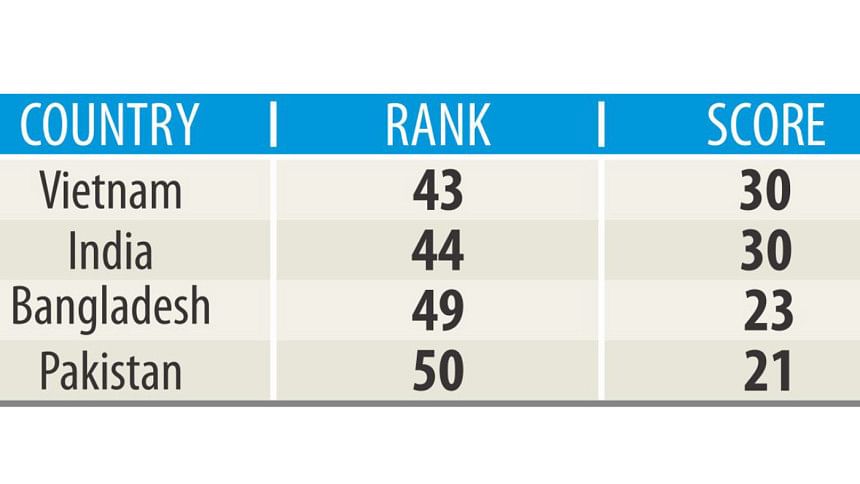Bangladesh's digital footprints growing

Bangladesh has been included in a list of 50 countries for its growth in areas of smartphone uptake, mobile broadband and high-speed internet access in 2016.
The country ranks 49th in Huawei's Global Connectivity Index 2016, one spot better than Pakistan, which was positioned last on the list. Neighbouring India came in at No. 44.
The index, which is now in its third year, measures how the 50 countries, which account for 90 percent of the global gross domestic product and 78 percent of the global population, are progressing with digital transformation.
The progress is quantified using 40 indicators that cover the supply, demand, experience and potential of five technology enablers: broadband, data centres, cloud, big data and the internet of things (IoT).
Investing in these five technologies enables nations to digitise their economies.
The index identified three groups of nations: starters, adopters and frontrunners. Bangladesh, with a score of 23 out of 100, was grouped in the 'starters' category, which is in the early stage of ICT infrastructure build-out.
“Starters are not fully benefitting from the digital economy and its potential to raise incomes and overall quality of life,” said the report.
To become adopters and then frontrunners, the report recommended starters should increase their ICT investment to accelerate nationwide broadband coverage, reduce tariffs and provide subsidies for smartphones, and issue more telecom licences to raise coverage and encourage competitive pricing.
About Bangladesh, the report said uptake in smartphone, mobile internet and broadband has seen some improvements in 2016 over 2015.
The launch of 3G networks has boosted mobile internet.
“Internet penetration is relatively low, but the potential is strong for the local internet industry to move into the next stage of development.”
The growth in mobile customers in 2016 and 2017 is expected to be high, and 4G services are planned for 2017.
Under its vision of a “digital Bangladesh”, the government aims to establish nationwide internet connectivity and a strong ICT workforce by 2021.
About the opportunities for Bangladesh, the report said the country must work hard to overcome limitations in ICT infrastructure to boost internet access for all levels of society.
“The government's influence and policies are crucial to establishing nationwide connectivity.”
The report said, with improved infrastructure and faster connections, the government can roll out digitisation initiatives and offer public services online.
Investing in digital infrastructure correlates to GDP gains because it increases economic dynamism, efficiency and productivity.
“A revolutionary shift is occurring in the way the world works, with economies across the planet going digital fast,” said Kevin Zhang, president of Huawei's corporate marketing in a statement.
Nations that are in the early stages of economic digitisation should develop long-term technology plans that include broadband and data centres to reap the benefits of enhanced growth, he said.
“Developed economies wanting to capitalise on their frontrunner ICT status should invest more in cloud, big data, and IoT technologies and solutions to experience the full benefits of a digital economy,” Zhang added.
In today's world, the digital economy has emerged as an unstoppable giant that is growing at 10 percent a year -- more than triple the rate of overall global economic growth, the report said.
The worldwide digital economy generated $24 trillion in e-commerce in 2015 and accounted for 30 percent of all global transactions. Much of this was completed on 2.5 billion smart devices spread somewhat unevenly among the world's 7.4 billion people.

 For all latest news, follow The Daily Star's Google News channel.
For all latest news, follow The Daily Star's Google News channel. 




Comments